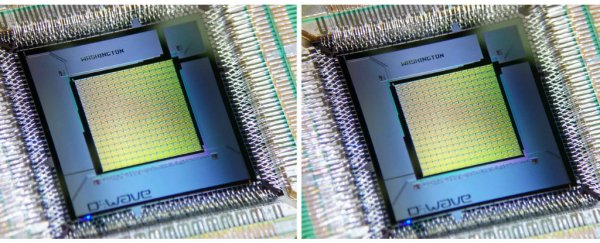Google has been sharing more details about its quantum computing project, which it runs in partnership with NASA. The tech company says its mammoth D-Wave 2X quantum computing machine has been figuring out algorithms at 100,000,000 times the speed that a traditional computer chip can, and that could make a huge difference in the processing power at our disposal in the future.
In quantum computing (closely linked to quantum mechanics), quantum bits (or 'qubits') can simultaneously hold values of 1, 0, or both, rather than being set to 1 or 0 as traditional electronic bits are. The qubits are tiny particles suspended in temperatures just above absolute zero, and as more qubits are added, the available processing power goes up exponentially. Big data problems, such as weather forecasts or chemical analysis, could be dealt with much faster through the power of quantum computing.
We're not quite there yet - to the best of our knowledge, anyway - but Google's announcement marks another step forward in making quantum computing a reality that can have a substantial impact on technology and science research. As Jordan Novet at VentureBeat reports, it's also a justification of the work D-Wave has been doing with its machines, which have also been sold to companies including Lockheed Martin and the Los Alamos National Laboratory.
Trying to get an understanding of the new developments without a physics degree and a mastery of scientific jargon isn't easy, but essentially, researchers ran simulated tests of standard computer chips and compared them against the capabilities of the D-Wave 2X when doing the same sums - that's where the 100 million speed increase was noted.
That's an impressive figure, but we're not quite in the age of quantum computing just yet. "While these results are intriguing and very encouraging, there is more work ahead to turn quantum enhanced optimisation into a practical technology," writes Google's Hartmut Neven on the company's blog. The team has also published a paper on its findings.
Quantum computing theory is all well and good, but we're still waiting for confirmation that these ideas can actually work in practice. As Gizmodo notes, not everyone is convinced that the D-Wave 2X is a true quantum computer; there's also some discussion around the efficiency of the algorithms used in Google's simulation of the regular computer chip, which could possibly have been optimised further.
While scientists debate the various merits of this particular super machine, the likes of IBM and Microsoft are joining Google in the race to crack the quantum computing code. According to Microsoft, we could see a working quantum computer within the next 10 years - although D-Wave still maintains the necessary technology is already here.
